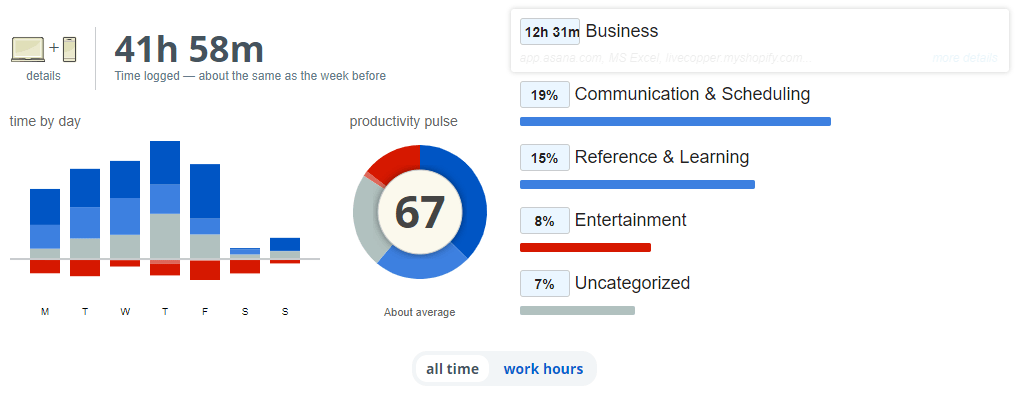While organization and patience are crucial to your success as a wedding planner, none of it will come in handy if you don’t master the art of effective time management. Time management skills are the unsung heros of the wedding sector.
Now more than ever, the most desirable social currency is time—and knowing how to use it wisely. As a result, time management skills are critical to every facet of successful wedding planning.
Need a few ideas on how to wrangle you schedule back into some sense of order? We are here to help.
15 Time Management Skills for Wedding Coordinators
Based from our own experience, here are 15 tips to help you stay on schedule, even in peak wedding season chaos.
1. Create a Schedule
Creating a schedule seems obvious, but it’s how you make your schedule that will help you use your time effectively and accomplish your daily task list.
Think of this as your personalized wedding planner’s time management schedule.
First, know thyself. If you work more effectively with analog tools like a calendar that fits into your purse, colorful reminder Post-its, or a notebook you’ve nicknamed “The Bible,” stick to hard copies.
Establish regular habits on specific days. For example, Mondays can be your check-in day with couples. On this day you get updates on what wedding tasks they’ve accomplished over the weekend. Tuesday mornings can be your vendor outreach time. On Tuesdays you ensure every detail you’ve discussed on your clients’ behalf is moving forward.
If your life is fully digitized and you have an app for nearly everything, there are numerous online resources at your fingertips.

RescueTime is a dedicated time management app that can help you identify the areas of your life that are unproductive “time sucks.” The app can block the sites that most negatively impact your focus. A daily “Focus Work Goal” helps you stay on track and ignore the clutter.
Trello is one of the most popular online tools to organize your work. Manage projects, organize tasks, and track your progress. If you have a team, these can all be shared and tasks delegated. Get everyone on board with what is done and what is still outstanding.
2. Learn to Delegate
Just because you can do “all the things” doesn’t mean you should. Research shows that women, in particular, take on a disproportionate amount of work in the office. Even if you are a sole proprietor, take a step back to see what tasks you genuinely want to take on and manage from start to finish.
While on site at wedding-related events, build relationships with colleagues in the business so you can create and earn trust. Working harmoniously and dividing up tasks will free you to concentrate on what you’ve been contracted to do.
Delegating also empowers others. If you have an assistant or even a day-of assistant, spell out their duties and your expectations in advance. Open lines of communication are imperative in the wedding planning business.
3. Stop Multitasking, Start Habit Stacking
Multitasking, the art of doing multiple things simultaneously, sounds productive but, in reality, is your focus divided. In addition, many tasks require your total concentration, including invoicing and updating your accounting.
Habit stacking is the art of creating simple routines and making them rituals, or habits, that you accomplish daily with the help of a checklist. By following the repetitive order, you save time and reduce distractions—the goal of mastering time management skills.
For example, if social media updates are essential to growing your business, use a monthly planner and “stack” enjoying your morning coffee with a dedicated 10 minutes to post and engage your audience. Creating these habits makes your tasks second nature.
4. Establish Self-Imposed Deadlines
As organized wedding planners, when other vendors and colleagues set a deadline to have a guest count finalized or a balance paid in full, we typically abide by the date provided. So why don’t we do the same for ourselves?
Developing an effective time management schedule identifies how long your rituals—your daily, weekly, or monthly tasks—take.
If you do monthly accounting and invoicing, you should have a good idea if that process takes a few hours or half a day. Create realistic deadlines for your regular tasks and respect those deadlines as you would any client.
5. Set Specific Goals
The mistake people can make with goal setting is identifying what they want to accomplish without the steps for how they will accomplish that goal.
If your goal is to increase your wedding planning business’s social media following, you’ll set yourself up for success if you take a look at the existing data to identify your current growth rate, then set a reasonable goal.
Next, prioritize your goals and commit to them.
Finally, take note of what’s advancing you toward accomplishing them or what’s holding you back. These steps can be insightful as you develop time management skills.
6. Set Aside Self-Care Time
Wedding planning can be a highly stressful industry, and the range of emotions your clients will navigate are often placed on your shoulders. Part of practical time management skills is ensuring your needs are also met.
A mid-day meditation, a brisk walk, a regular workout—even just a daily ritual of tea is essential to keep stress at bay.
Sleep health is also critical. As a wedding planner, you’ll want to get everything done, and that sometimes means late nights. But working into the wee hours depletes your energy and focus the next day.
7. Ask Yourself, What Can Be Outsourced?
Audit how you spend your time in any given week or month for that matter. You’ll likely walk away with some valuable insights, including what tasks are most time-consuming and can be tackled more effectively.
If administrative or technical tasks are weighing you down, consider a virtual assistant. Typically, VAs are paid hourly and can be well worth the investment if they free up your time for managing other wedding planning projects.
8. Expect the Unexpected
Wedding planners can spend a lot of time behind the wheel. Meetings with florists and venue managers, photographers, and entertainment specialists are all part of the job. When planning your schedule, add extra time to travel to meeting locations to stay on schedule. Extra time for travel will prevent panic when unexpected traffic arises.

9. Create Meeting Agendas with Time Blocks
Whether face-to-face or virtual, meetings in the wedding planning industry are nonstop, and plenty “run over” your guesstimated meeting time. Prevent this by setting start and end times. This way, both you and your client or colleagues know precisely the amount of time you have to accomplish the business at hand.
10. Automate as Much as Possible
Does your wedding planner website say you’ll respond to inquiries within one business day? Transactional emails take up considerable time. Automated responses are an effective method of responding to user-specific messages while building a database—and an audience.
11. “No” is a Complete Sentence
Before haphazardly agreeing to take on one more thing, consider the schedule you’ve created and ask yourself if there is space, i.e. extra time, for you to complete this task.
Will this task advance your clients’ needs? Saying “no” to things that don’t serve you creates professional boundaries and helps you stay on an effective time management schedule.
12. Pinpoint Essential Actions
Differentiate the tasks you want to do from the tasks that you need to do. To accomplish this, identify the things in your wedding planning business that you do regularly. For example, respond to inquiries, pay bills, schedule site tours.
Determining what needs to be done allows you to build time blocks and identify essential but less urgent tasks.
13. Go Virtual When Possible
If there’s one thing the pandemic taught corporate America, it’s that many meetings can 1.) be an email, and 2.) be done virtually.
For venues that are not close by or those your clients might have on their “maybe but not likely” list, a virtual tour can be done in a fraction of the time an in-person tour takes.
Virtual meetings can also be done with florists, stationary for invitations and save-the-dates, and other vendors where the visual is of the utmost importance. An in-person meeting isn’t necessary in every situation.
14. Phone vs. Email
As a wedding planner, you spend a lot of time communicating with clients, vendors, venues, and more. As a result, it’s very easy to get caught up in a day-long email exchange that can be simply resolved with one short phone call.
If you think there will be many questions, take the conversation offline and schedule a call with a beginning and end time. Then, address all related questions at the time of the call, resolve the issue, and eliminate a time-consuming back-and-forth string of emails.
For example, if you have a complex issue or a detailed vendor agreement you’ll want to walk through, a short call is best to cover the specifics and answer questions as you go along.
15. Provide an Inquiry Form on Your Website
Inquiry forms are a great way to keep track of your leads.
Moreover, when they require essential information, like the wedding date, you can let potential clients know right away if you’re even available before taking a conversation any further.
Time Management Skills: Learning What Works For You
Wedding planning usually has you pulled in myriad different directions, all at once. Keeping to a schedule that leverages your productive time will maximize your efforts.
Time management skills evolve, but with a few essential tools, careful consideration, tracking, and evaluation, you can create a customized schedule that helps you plan weddings in the most effective manner possible.













